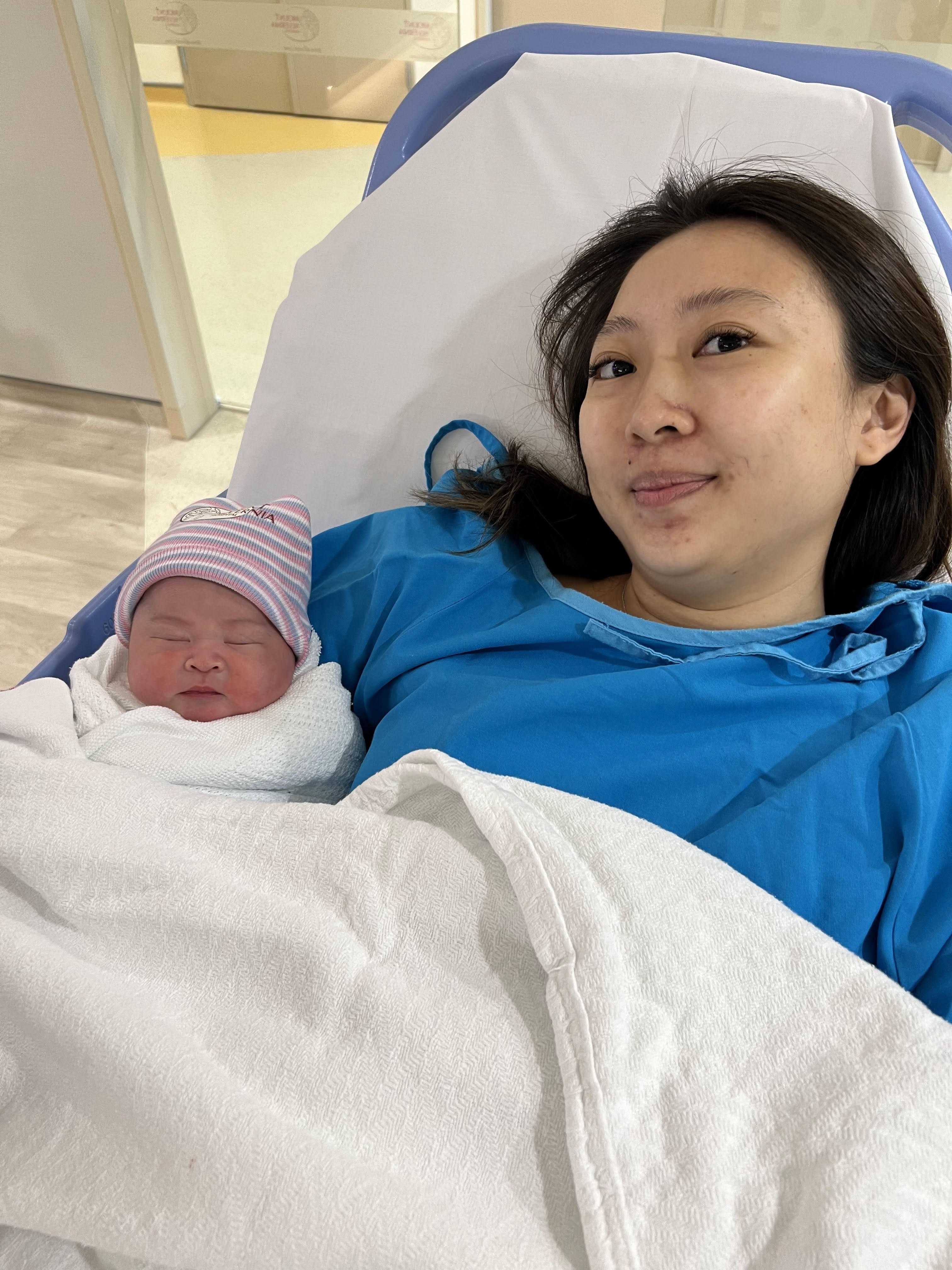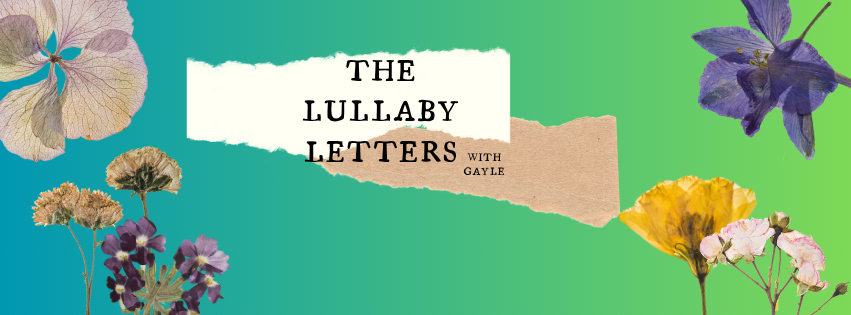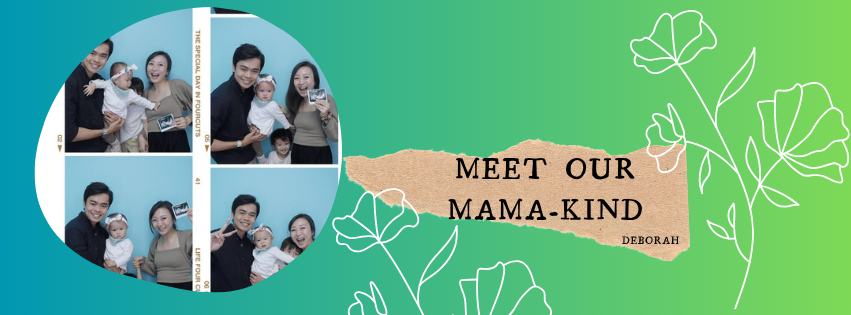Welcome to The Lullaby Letters, often penned in the quiet hours next to my sometimes snoring toddler. In each edition, I curate useful prenatal and postpartum resources, and in "Meet our Mama-Kind", I invite inspiring mamas to share their journey and perspectives.
This month, I chat with Deborah Chia, a mama of soon-to-be-3 who shares her experience of having an unmedicated birth for her second born.
If you found this newsletter helpful, I would love for you to forward it on to other mama friends. :)
If you're new here, do sign up for the newsletter here to receive future editions.
On Birthdays, Birth Stories and Becoming
My toddler turned two this month. 🥹
That night after the birthday party, after the guests have left and the house was quiet once more, I got caught up in a swell of memories. I started scrolling through my phone, all the way back to his birth pictures, lying on my chest in his hospital swaddle, squinting at the camera. It brought me back to the moment I first met him, as I lay groggy after an emergency c-section, watching as a little tear rolled down his cheek. His birth day, was also the day I became a mama.
My birth experience was not what I expected, but I was glad that at the end of the day, that both baby and I were safe and healthy. It's something I share as I worked with so many mamas leading up to their delivery, that everyone's birth experience is unique. It can be different from your birth plan, and it can vary from your expectations, even after prepping with antenatal birth classes. But it is your experience to own, and it will become your story to tell.
P.S. If your little one's birthday is coming up, check out these DIY recipes, or these local bakeries which serve healthier bakes (also perfect for those who might have gestational diabetes):
✅ Make your own healthy birthday smash cake (A recipe from a mama dietician)
✅ Make your own fruits-only birthday cake
✅ Delcie's Desserts and Cakes for toddlers to seniors
✅ Sugar-free Japanese-style bakes from Kekito bakery
Meet Deborah :)
If you've been coming for my weekday classes, you might have met Deborah. At 35 weeks now, she first came to class still in postpartum recovery, but radiant in her prenatal glow. I enjoyed hearing her birth stories and how her experiences varied between a medicated versus an unmedicated birth, and I'll let her tell it to you here.
1. Hi Deborah! Can you introduce yourself?
Hi! I’m a mum of two (3.5-year-old boy and 16-month-old girl). Early this year, we had a surprise when we found out we were expecting our third. We kind of knew that we wanted to have three kids, but we didn’t expect that it would happen so soon — I was still breastfeeding my daughter at the time. It saddens me that kids are often seen as a burden these days, financial or otherwise. We really see kids as a blessing, so we trust that this is the best timing and age gaps for our specific family!
2. Can you tell us about the birth for your first kid, and why you decided to try something different for your second delivery?
Before the birth of my first child, I’d kind of had some exposure to the idea of pain-free childbirth. Part of it was because there’s this idea that God actually didn’t intend for birth to be painful the way we always see it depicted. I also chanced upon content by doulas and midwives about unmedicated and ecstatic births. I started exploring the idea a bit more but I wasn’t super committed to it because I felt like I wasn’t sure what it could look like. A lot of the portrayals in the media and the way people describe their own births tend to seem very excruciating.
When it came time to deliver, my water bag burst around 4am after a night of contractions. It was quite manageable but I think as first-time parents we thought, “okay, we should go in because the waterbag has burst.” This was something we would have done differently — the wait is a lot more boring and frustrating in the delivery ward than at home/outside doing other things. I later also learnt that yes, risk of infection increases after the bag bursts and more time has passed, but it may not be significant unless there are other risk factors.
To be honest, it was really still quite manageable all the way until about 5pm? I don’t think I was anywhere near what we see on TV when women are in labour. But once I got tired and frustrated, that’s when it felt like the pain intensified. I subsequently asked for laughing gas and an epidural, which I did feel I needed since I needed some rest. I later delivered around 3am.
When I looked back, I really did not enjoy the experience, nor feel empowered during the process. Part of it was that I wasn’t expecting the side effects of the pain medication. I had only heard good things about the “happy-dural” (rightfully coined term, it does help many effectively!) and did not know that some people experienced side effects. For me, I remember getting the shakes throughout the labour. I also puked. I was so drugged out that I didn’t remember much of the delivery, I just remember being woken up to push, pushing a couple of times and baby being out. I wasn’t really conscious of what was happening after that. A few months postpartum, I asked my husband, “hey, actually I realised we didn’t get to have the golden hour in the birthing suite with our son?” And he told me we did — for me it felt like just 5 minutes but I’d latched him successfully and did skin on skin. I wouldn’t completely attribute it to the labour/pain medication but I also didn’t feel very bonded with my son in the initial stages.
I think that made me more determined to discover more about our bodies’ mechanisms to manage and cope with the labour experience.
I realised that pain-free doesn’t mean there’s no intensity. It helped me to see it as a workout — when you do a workout, you get tired, you might even feel a strain, but it isn’t necessarily pain.
And incidentally, some physical fitness and endurance does also prepare the body better for delivery (especially with workouts tailored to help the body open up etc).
The other key thing is that fear has a big part in influencing our perception of pain because it increases tension, and therefore pain. And unfortunately, because of the way childbirth is portrayed and talked about, it inevitably reinforces this fear in many of us.
I also feel like I’m quite nerdy — so learning about physiological birth was very helpful in empowering me to believe that my body has what it takes to birth. There are many natural mechanisms that support unmedicated birth, and in fact, many of them function best when there’s no interference from medication (but first, fear has to be dealt with). For example, the oxytocin hormone not only reduces our experience of pain during labour but also stimulates letdown reflex (for breastfeeding) and bonding between mother and baby. Endorphins are pain blockers that join perfectly with our pain receptors. They also aid in milk production. So multifunctional and efficient right?! And in an unmedicated birth, some women can experience a high that rivals even that of consuming hard drugs. Many women also ride this birth high for even up to six weeks after delivery — sounds like a natural antidote to the hormone drop after birth, and possibly some of the effects of postpartum depression. There’s also a fetal ejection reflex which mums experience that can allow their bodies to push baby out on their own rather than having to go through coached/purple pushing.
Reading all these material and watching successful physiological births was highly encouraging to me. I won’t lie and say I was 100% sure that I could do it, but I definitely wanted to try.
3. How did it go for your second delivery, this time unmedicated?
After sharing my preferences with my gynae, who was pretty supportive, I had a happy 2nd birth unmedicated. This time we waited as long as possible before going in to the hospital, before 7am and we delivered before 12 noon. When I’d first gone in, a nurse did a quick cervical check and found that I was 5-6cm dilated. She then expressed her shock and said, “you’re still so calm, I wasn’t expecting you to be this far along.” I also trusted my body more. I felt more discomfort when I was seated/lying, so I just got up and walked about the room for a lot of the time (which I wouldn’t have been able to do if I had an epidural). I would assume certain positions to help baby descend more easily. Breathing through the contractions and reminding myself not to tense up was really helpful too. And my husband also helped with magical *hip squeezes* (see the first movement at the very start of this video). Seriously, make your husband learn this, it really helps so much!
Everything was very normal and chill until we hit about 8cm. I think that’s the point I know I felt a bit of fear and tension because it felt like my body was already pushing baby out and my gynae wasn’t there yet. Looking back, I would’ve trusted my body more and just went with it. But that part was pretty short, because baby was out within an hour from that point. I didn’t really feel the “ring of fire”, I didn’t experience any tearing, and I’m sure it helped that this was my second birth, but she was also 3.5kg (500g bigger than my first). I felt like my recovery was also pretty quick.
An unmedicated/physiological birth is not the only way, but if it’s something that resonates with you, then I’d encourage you to explore it thoroughly and not feel like it’s something out of reach. I’m also happy to nerd out and have a conversation anytime ~ the more I learn, the more in awe I am about how our bodies have been designed and what we are capable of!
 [Image of Deborah with her second born]
[Image of Deborah with her second born]
Conscious, happy, not shaking and not puking 😁
3. For those contemplating a non-medicated birth, what are some reading resources you would recommend?
I followed @painfreebirth on IG because they post a lot of tips (there’s a full course also for those who want a more guided approach) and a lot of positive physiological birth stories which I feel changes our visualisation of what birth looks like — so many of these mamas birth so calmly, and are in control (even if they are loud).
Some books:
Ina May’s Guide to Childbirth by Ina May Gaskin
Supernatural Childbirth by Jackie Mize (for those seeking a spiritual perspective)
4. What’s your advice on coping with pain (or fears of perineal tearing) for a first-time mama going into delivery soon?
I think learning about the whole labour process and your body’s abilities can be very helpful! The knowledge can help to suppress the fear involved with childbirth/uncertainty.
Practically, my gynae recommended getting the Epi-no and using it towards the end of pregnancy — they have a claim of over 70% of women not experiencing tears.
I was a bit lazy with this and didn’t end up doing it. I did tear, but honestly, I didn’t notice it at all during labour (there’s a lot more going on!) and I recovered pretty quickly too! I feel like the idea of tearing is really horrible, but the actual experience is not that big a deal. I had specifically told my gynae not to give me an episiotomy because if there’s a chance I wouldn’t tear at all, why not, right?
Also, newborn babies heads are mouldable! That’s how those big heads make it out — the bone plates haven’t fused. So a “big head” doesn’t make an episiotomy a necessity.
How you breathe and push matters too: Pushing gradually helps the perineum stretch slowly, compared to pushing too hard and too suddenly. Think about how a rubber band can stretch so much more if you do it gradually, but snaps if you pull on it suddenly.
5. What is one thing you've learnt (or had to unlearn) when it comes to parenting?
Wow. This is a big question. I actually don’t know where to start. But maybe I’ll stick closer to the earlier stage post-childbirth since a lot of my sharing is about that. I feel like we’re so much in control of our lives as we became adults — we run on specific schedules, we make plans etc. but having children especially at the very early stage can make you lose sense of that control. I think with my first, at the start, I fought very hard to regain that sense of control. I was always googling what’s normal, or trying to figure out how long a phase would last, especially in the first year where they are just constantly changing! In hindsight, it definitely made feeding, sleeping a lot more stressful.
Having my second felt a lot easier because I went with the flow a lot more and knew that things would work out… baby would nap properly after a certain stage… baby would sleep through the night and the whole household would get to again trusting my body when it came to breastfeeding and not worrying too much about topping up, knowing exactly how much baby was drinking, made the whole experience a lot more enjoyable — and maybe made it possible for me to do so for longer than the first time. When going through those challenges, it really does feel like forever!!! But somehow what they say about the days being long, and the years being short really rings true.
But I feel like "losing" the sense of control actually was such a needful perspective. It reminded me that we're actually really not in control. And that's okay, we don't have to be, it's not all on us (although it certainly feels like a lot of the time). It's freeing to be reminded that we don't have to have it all covered. Which is ironic, because we're responsible for a life but also, there can be a much more restful approach to life.
Also, on a lighter note, if you are afraid of turning into a helicopter parent, have more than one child. It's impossible to helicopter many children.
💬 I hope you've enjoyed this edition of The Lullaby Letters. If you've any thoughts or questions, feel free to reach out here. 🤍
Love,
Gayle
Creator of Dear Postpartum Mama



